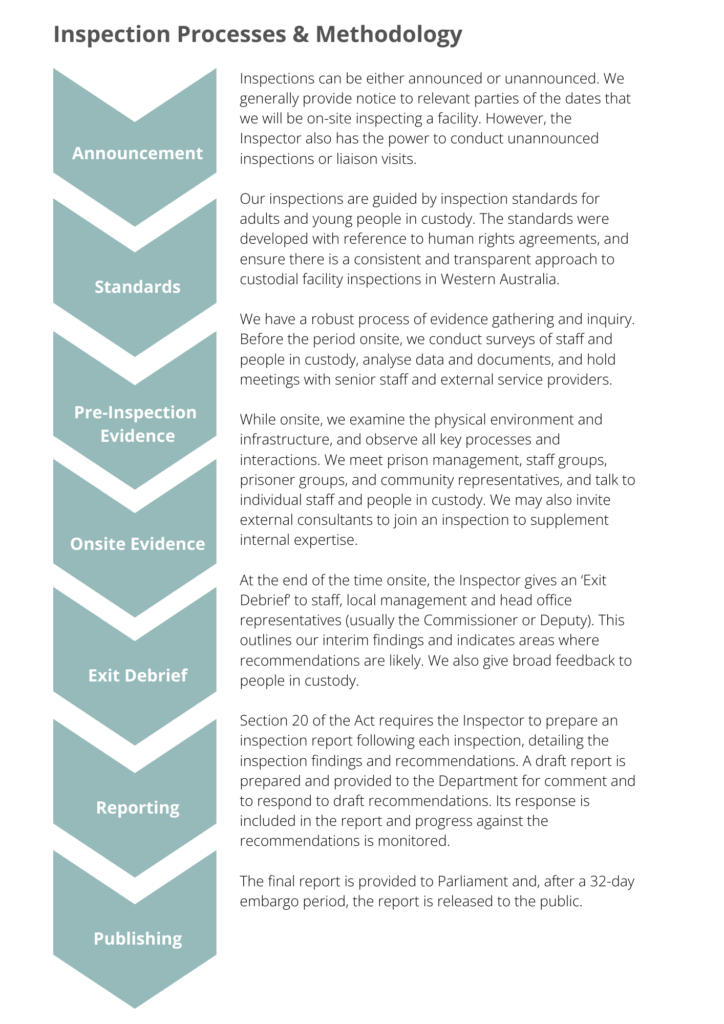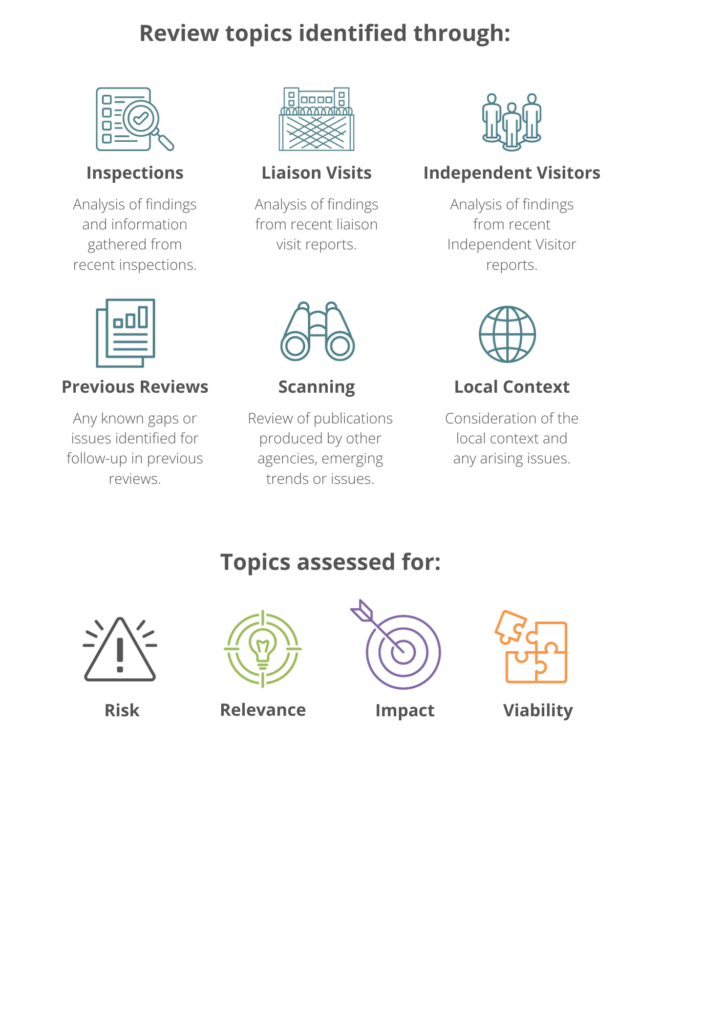Inspections
Under sections 19-20 of the Inspector of Custodial Services Act 2003 (the Act) we must inspect and report to Parliament at least once every three years on the following sites:
- 17 prisons
- five prison work camps
- youth detention centres
- all court custody centres
- police lock ups that have been ‘prescribed’ to be used as court custody centres.
We also have jurisdiction to inspect prisoner transport arrangements but, unlike prisons, are not required to report on this every three years.
Inspection standards
The publication of these standards represented an important contribution to consistency and transparency of prison inspection in Western Australia. The standards were developed taking into account the full range of relevant international treaties, covenants, and the Standard Guidelines for Corrections in Australia. They have also drawn upon the UK Prison Service’s Decency Agenda, the UK Inspector of Prisons’ Expectations, the then Western Australia Ministry of Justice Inspections Manual, the national correctional reporting framework, observed practice, community standards and relevant research into the performance of custodial services. But perhaps most influential in developing the standards was the experience gained in inspections conducted and reported upon by the Inspector since 2001.
Revised Code of Inspection Standards for Adult Custodial Services
Code of inspection standards for young people in detention (2010)
Methodology
We use the following methodology for our inspections:

Liaison
Liaison visits are one of the most important tools that the Inspector uses as part of a continuous inspection model.
We conduct regular liaison visits to all places of custody in our jurisdiction. These visits are a crucial element in monitoring performance, risk and improvement opportunities. In addition to liaison visits, we also visit sites on a less formal basis.
Our visit schedule reflects risk, and therefore varies between sites and over time. We visit most prisons at least four times each year, and the higher risk prisons and Banksia Hill Detention Centre at least six times a year. We generally visit work camps and court custody centres at least once a year.
Liaison visits can be announced or unannounced. We usually give some advance notice so the facilities can help us engage with relevant staff and people in custody, but it is common for visits to be conducted at short notice. We will do unannounced visits as necessary or appropriate.
Review
The Inspector of Custodial Services Amendment Act 2011 was enacted in response to the Coronial inquest into the heat-related death of Aboriginal elder, Mr Ward, in a prisoner transport vehicle. It expanded and embedded the Inspectorate’s powers to examine aspects of custodial services and the experience of individuals or groups of people in custody. We developed our review function to exercise these powers.
We analyse multiple sources of information to derive and validate findings. These include academic and professional reviews, evidence from other jurisdictions, and data from the Department’s offender management database. We also use other departmental documents, as well as advice from stakeholders and service provides.
Like inspections, reviews lead to findings and may include advice and recommendations. Since 2012, we have addressed a wide range of topics relating to security, safety, health, welfare, rehabilitation and management.
Processes have been developed to assist the Inspector identify and select review topics in an objective and robust way, as follows:

Community Liaison
Our Community Liaison Officer (CLO) is a proud Ballardong man and Elder. He provides highly valued cultural context in working with staff across the Office and with people in the community. The CLO maintains a large community network and helps the Office engage with culturally diverse prisoners and young people in detention, community organisations, and families. Through this engagement, the CLO provides important information, links and referrals to appropriate services within the Department or other support organisations. He also provides advice to staff in the Office on cultural issues and protocols.
Nomination as National Preventive Mechanism under OPCAT
In 2019, the Office of the Inspector of Custodial Services was designated by the Government of Western Australia as the National Preventive Mechanism (NPM) under the Optional Protocol to the Convention Against Torture and Other Cruel, Inhuman or Degrading Treatment or Punishment (OPCAT) for justice related facilities in Western Australia. This included police lock-ups, which the Office did not historically have jurisdiction over.
However, legislative amendments to enable the Office to undertake its NPM role have not progressed. As a result, the Office has not commenced these additional duties.
The Office works collaboratively with other NPMs across Australia and with the Commonwealth Ombudsman as the national NPM coordinator.
The Western Australian Ombudsman has also been nominated as a NPM in Western Australia for mental health and other secure facilities.
What we don’t do
The Office of the Inspector of Custodial Services works alongside other accountability agencies in Western Australia as well as government agencies who protect the rights of individuals and provide impartial resolution services. Each of these agencies has a predefined role which cannot be duplicated by this Office.
This Office does not investigate fraud or other criminal matters
The Inspector of Custodial Services cannot investigate criminal matters. If such a matter is brought to our attention or we become aware of it through our work, then it is automatically passed to the Police or the Corruption and Crime Commission.
This Office doesn’t investigate complaints relating to individuals
The Inspector of Custodial Services does not investigate complaints made by staff, prisoners, detainees or their families. While it is often important that this Office understands the nature of a complaint this information is only used to understand whether systemic issues are occurring in the corrections system. The Office cannot facilitate a resolution of a complaint for an individual. Such matters are the mandate of the Ombudsman, Equal Opportunities Commission, or in the case of health or disability matters the Health and Disability Services Complaints Office (HaDSCO).
Page last updated: 05 Nov 2025